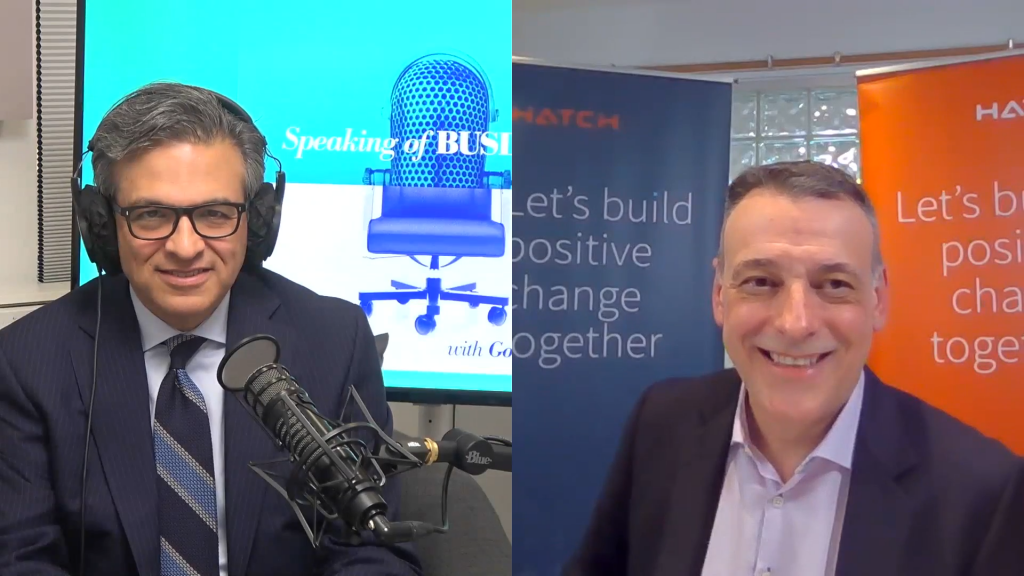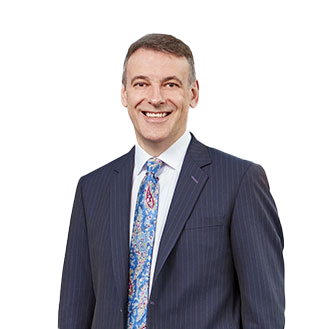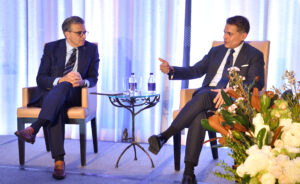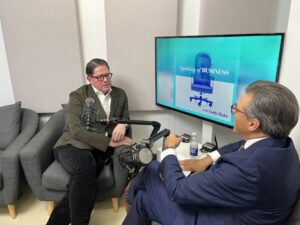They’re taking on underground construction obstacles, tackling mining and energy quandaries, and don’t hesitate to brainstorm daily about how to address climate change.
Hatch is an engineering and professional services firm that employs 12,000 people in 150 countries around the world, all from its perch in Mississauga, ON.
But you may have never heard of them, and that’s by design.
“It’s true that we’re not a household name,” says Hatch Chairman and CEO John Bianchini. “We’re employee-owned and we don’t feel the need to advertise other than – in the good old Canadian way – based on what we do.”

Hatch may shun the spotlight, but the company loves a challenge, and has taken on some of the world’s toughest problems.
When it comes to climate change, Bianchini says it’s an existential threat. “We’re in the climate change economy,” he explains. “Pretty much everything that drives the economy today is around our battle to remove carbon from the atmosphere and making sure we don’t put too much more in there.”
In a colourful and wide-ranging interview with Goldy Hyder on the Speaking of Business podcast, Bianchini also discusses ways to unleash Canada’s entrepreneurial spirit, the importance of mentoring the next generation, why he is a big supporter of arts and culture, and he weighs in on the work-from-home vs work-from-the-office debate.
John Bianchini
I hope that at least in my lifetime, Canada, we can assert ourselves as the true global leaders that we can be. And really be the best example of what we call at Hatch positive change in the world.
Goldy Hyder:
Welcome to Speaking of Business. Conversations with Canadian innovators, entrepreneurs, and business leaders. I’m Goldy Hyder, president and CEO of the Business Council of Canada. I often talk on this podcast about Canadian companies that are making their mark on the world stage. It’s something that Mississauga-based Hatch does every day. And if you haven’t heard of Hatch, consider this a much overdue introduction. Hatch is an incredible Canadian success story. With its origins in 1950s Toronto, the professional engineering company now counts 12,000 employees in 150 countries. Its focus is on solving problems, be they underground construction obstacles, or mining and energy quandaries, or innovating to address climate change, or countless other issues. Hatch loves a challenge, so too does its Chairman and CEO, John Bianchini. I am delighted to be able to speak with him. Welcome to the podcast, John.
John Bianchini:
Thank you, Goldy. It’s great to be here and thanks for the great introduction.
Goldy Hyder:
Well, let’s start with the introduction. I mentioned that it’s almost like a coming out party for people who are listening to this podcast about Hatch. Tell us about Hatch. Tell me about what it is Hatch does.
John Bianchini:
Yeah. That’s not surprising, Goldy, some of my colleagues have often said, and some of my acquaintances that learn about us, they call us Canada’s best kept secret. And it’s true that we’re not a household word, and maybe a bit of that is because we’re a private company, we’re employee owned, and we don’t feel the need to advertise really other than based on, in the good old Canadian way, based on what we do. We call ourselves a professional services firm. We are a group of professionals that try to tackle the world’s toughest problems, as you quite rightly said. And our base is in science, technology and engineering. But today we have professionals from all walks of life solving all kinds of issues because the world’s toughest challenges today, they need a multidisciplinary response.
We’re best known, I guess, for working in three sectors. The best one that we’re known for around the world is mining and metals. So think of the Sudbury Basin. We were instrumental in developing the nickel technology that Canada enjoys. We work in infrastructure, and there you might think about those round tunnels underneath Queen’s Park, those were original Hatch designs. And pretty much every tunnel in the GTA was designed by Hatch. And the third sector we work in is in energy. So there you might want to think about hydropower generation at Niagara Falls, we built one of the earliest and the most recent power stations there. So that’s kind of what we do. And as you said, we’re about 12,000 people around the world started right here in Toronto.
Goldy Hyder:
I’d read somewhere that Hatch describes itself as entrepreneurs with a technical soul. What does that mean in practice?
John Bianchini:
Yeah. We call that, Goldy, the personification of our manifesto. Simply our manifesto is a description of our culture. It’s what we choose to be. And entrepreneurs with a technical soul really embodies how we view ourselves and how we hope others view us. And that’s technical people that are committed to creating a better world, creating positive change. And the way we do that is by bringing together good basic technical knowledge from multi-disciplines and combining that with business acumen to create a practical economic sustainable solution.
Goldy Hyder:
I mean, in effect you’re problem solvers.
John Bianchini:
Yeah.
Goldy Hyder:
I see you as solving problems. Now, I guess, that of course leads to the question, are there problems you’ve been stuck with that you’ve been unable to solve or are there things that you’re working on now that you might be able to share in terms of some of the challenges you’re dealing with today?
John Bianchini:
It would be arrogant of us to say that we’ve been able to perfectly solve everything that was being brought to us. But I will say that we do tend to really succeed at what we put our minds to. But some of them, let’s say we’re still working on after many years and decades, we haven’t given up yet. But I mean, the one that comes to mind of course, and it’s on everybody’s mind today, is the existential challenge of climate change. I mean, there are many aspects about climate change that I think us and technically minded people are coming to grips with. But there are many that are very, very elusive. For example, one of the things that ultimately we will have to do to combat climate change is to pull carbon out of the air in very dilute amounts that it exists. That is extremely difficult. A lot of people working on it. We’re working on it. We have a lot of partners on it. But it’s that’s going to take years and decades, I’m afraid, to get to the bottom of.
Goldy Hyder:
You’re based in Mississauga. You’ve got, as you mentioned, 12,000 employees, 150 countries in the world. How did a little company that started up in Canada become a global champion in effect, a global leader?
John Bianchini:
Well, great question. I get asked that a lot, Goldy. And it comes from humble beginnings. Our founder, Jerry Hatch, good Canadian boy, born in Ontario, studied in Quebec, went to school in the United States. When he completed his studies, he came to Canada and took on one of the toughest challenges at the time, which just happened to be a new technology, a titanium technology, that was being established in Quebec. And long story short, he got it to work and he thought, well, maybe I can bring this acumen, this knowledge to other parts of society. He was a very outwardly going and engineer and a proud Canadian. And so he set up his company in Toronto and started to set out to solve some of the toughest challenges in the country. And one of the very first ones was the one I mentioned was creating a nickel business in the relatively newly discovered Sudbury Basin.
And so he went off and did that. And well over the years we made a habit of just solving the good old-fashioned challenges that Canada brought to us in those early years. Things like aluminum smelting, hydropower generation, oil sands development. And eventually our own customer, the big Canadian giants of the past, went around the world and they took us with them. And we found, lo and behold, that a lot of the challenges we were seeing in Canada were also being experienced around the world. And we brought a lot of the good old-fashioned Canadian technology and we started to answer some of the challenges elsewhere. And that was the beginning. And over time, of course, we went through organic growth from finding people that shared our culture and wanted to share our journey. And from time to time, we found companies that wanted to do the same thing and we brought them into the family and we are where we are today.
Goldy Hyder:
Well, let’s talk about how you joined that family. If I read correctly, you finished school or convocated, graduated on Friday and started work on Monday at Hatch and you’re CEO-
John Bianchini:
Your spies are good.
Goldy Hyder:
They’re good, hey.
John Bianchini:
They often say that, I didn’t know that people were writing that down.
Goldy Hyder:
Well, I mean, you certainly didn’t take the gap year as kids do these days.
John Bianchini:
No.
Goldy Hyder:
You took a gap weekend. Apparently you took that one off. But no, let’s talk about your story.
John Bianchini:
My dad and your dad, Goldy, would never allow us to take a gap year.
Goldy Hyder:
Are you kidding? No chance. Yeah. We’re going to come to our parents and our fathers in a minute here. But tell me about your own experience because here you are, you graduate. As you said, you finished Friday, on Monday you start and then you become CEO. That journey, tell us about that journey. What do you remember about it?
John Bianchini:
Well when I joined Hatch, it was in the middle of a recession. You remember the 1981 recession at the end of-
Goldy Hyder:
The 18 to 20% interest rates or something like that.
John Bianchini:
Right, exactly. I remember trying to buy my first house back then as I graduated. I was married during university. So I had a mortgage to pay. I had a student loan to pay off. So I was looking for a job. God bless Hatch because they’re the only ones that hired me. And that was through a professor at the University of Toronto where I studied. I got the lead and I knew I was joining a great company, but I really didn’t realize I was joining a company of icons. And really people like Jerry Hatch, who I’m sure many have known about, many, many accolades, real giants in Canadian business. And I started on my journey learning from them. And I was always interested in technology, that’s what drove me. That’s why I became an engineer. I’m a bit of a techno geek.
Goldy Hyder:
Before you leave that, tell me something that you took from Jerry. What is something that you can say because of Jerry, I’m a better leader today.
John Bianchini:
Oh there’s so many things, but oh, to just pick one, okay. Maybe the lasting one is Jerry, he was a fundamentalist. One of his great sayings that we still use at Hatch is “Do your homework”. In other words, understand the fundamentals. And often we use that talking about technology. But one of the things he really meant was really get to know people. Do your homework on people, get to know them. Spend some time with them, learn what drives them. You’ll be a better leader, but you’ll be a better human being and you’ll live a more fulfilling life. And lo and behold, he was right.
Goldy Hyder:
You mentioned your dad, condolences. He passed away on January 1st of this year, and I know that big influence in your life. Tell me about him and the journey that he took moving to Canada and you came shortly thereafter.
John Bianchini:
Yeah. You and I had a great discussion about this, Goldy, and you know I come from Italy. Our family was one of the last immigration waves in the ’60s. And I come from a region in Italy that’s very popular right now, Tuscany. And people often ask me, “How could you ever leave Florence and Lucca?” Where I was born. And I say, “Well, Italy after the war wasn’t the Italy that you see today”. And we were a poor, humble family. We came over basically like so many like you and your parents and so many other Canadian immigrants with our suitcases. And my dad worked as a factory laborer. My mom looked after my dad basically, he got an injury very early in his life that basically didn’t allow him to work permanently. He suffered from that injury pretty much for the rest of his life. So what he wanted for us, like many other immigrants, was just to have a great education. My mom, especially promoted education. My brothers and I, we were the first in our family to go to university. I’ve often said the best thing that my parents ever did for us was moving here because Canada has been fantastic for us. I mean, it changed our lives literally. And I often think about this and I have a lot, I think of my obligation to give back to Canada because our new home welcomed us so well.
Goldy Hyder:
And how do you think we’re doing?
John Bianchini:
Look, in the grand scheme of things, Canada and you know, Goldy, like you I travel the world. I spend a lot of time in the air and visiting the Hatch and clients around the world. Overall, Canada is an awesome, awesome package. I mean, we have a lot to offer and we should be confident of what we have to offer. Some of my examples from the past show that we have in the past offered a lot to the world. We have been global leaders. I think in the last decade or two, we’ve taken a step back, maybe longer. If you listen to some of our colleagues in the business council, they would say perhaps even longer. So I think we have some, while we’re still a great package, we’re one of the best countries in the world to live. Perhaps the best I would argue. We have a lot more to do. We’ve taken a step back in recent years and I think we should, and we can, regain that leadership role.
Goldy Hyder:
Expand on that for me. What are those steps back, what can we do to step forward I suppose?
John Bianchini:
From my perspective, I think from a company point of view, from industry, we have a role to play, the private and public firms in Canada. We have such great talent. We have wonderful teams, the best in the world or equal to anybody in the world. Some of our industry leadership should be taking more risks. I think our appetite for technical risk, for business risk has waned a little bit. For example, who would build an AECL today or who would build a new oil sands business? Especially in the area of technical risk, we’ve taken a step back. I think we’ve got to reexamine that. The other place that I like to speak a lot about is our government has a big role to play in all of this, of course.
I think we’ve overcomplicated policy and legislation in this country. I mean, I hear it all the time from companies that want to come to Canada, that were generally Canadian based and they’re confused. Our legislation, some of our policies are not transparent. It’s not easy to understand how to get things done here. My best example is we can’t build a meter of pipeline anymore in this country. It looks like we will never build another fossil fuel-based business in this country. It’s unclear how we reconcile with First Nations. And some of these things only our federal government, and to some extent our provincial governments, can deal with. And I think, frankly, we need better leadership and more confident leadership perhaps.
Goldy Hyder:
We’re talking in middle of March here in a matter of 10 days or so, Prime Minister Mulroney’s funeral will take place. And the legacy that he seemed to have imparted on us as Canadians goes all the way back to that free trade agreement in 1988. And as I reflect on his time, I think that one of the things that he did as a leader is to help Canadians believe in ourselves. But also show us what’s possible, where can we go. Do you feel that just the situationally now, that kind of leadership is hard to come by, not just in Canada, but almost anywhere it seems like, certainly in democracies?
John Bianchini:
I think you’re right, Goldy, and it’s good. I’ve been thinking a lot about Prime Minister Mulroney in the past couple of weeks. He was a great leader and he showed us the way.
Goldy Hyder:
But wasn’t it the risk taking? Wasn’t it the risk, I mean, let’s place some bets.
John Bianchini:
Well, it was a lot of things. He was a very confident person. He imbued confidence in the business leaders of the day, in his fellow politicians. He was a calculated risk-taker. You remember he was the president of Iron Ore Company, he probably learned a lot there. But on top of risk taking, the other thing that really struck me about Prime Minister Mulroney that we need more of today, Goldy, is he was able to change his mind.
Goldy Hyder:
Yes. On free trade itself, he was opposed to it before he was for it.
John Bianchini:
Exactly. We hold him up as the poster child for free trade, but very few people remember that he actually opposed it while he was in opposition. He changed his mind because he found a better idea and he was a strong enough and positive enough leader to openly admit it and then pursue it with passion. So do we need more of that in the world today? Yes. Do we see it enough in Canada and in other countries? Absolutely not. In fact, it’s hard for populist leaders to actually show that level of leadership. I think we’re in a difficult period, Goldy.
Goldy Hyder:
Well we’re going to have to pull ourselves out of it. You mentioned sort of three things there. One is really cultural, this sense of that some of my friends say risk comes to Canada to die, that other countries really embrace risk a lot more. There are structural issues, including just the breakdown of dialogue between people who disagree. It’s okay to disagree, but let’s talk to each other, whether that’s private sector, public sector, labour, academics, media. We’re almost all in our own corners. And the third thing you really mentioned is the importance of policy matters. Of those, what can we do about the culture piece? It’s such a soft EQ thing. How do we get that sense of what your father and my father and our parents, that sense of entrepreneurialism, that risk taking of crossing an ocean, coming with suitcases and 50 bucks, if you’re lucky, to really build this country back up.
John Bianchini:
It all starts with leadership, Goldy, of course. And I imagine, although I’ve never been in government, I imagine it’s the same in government as it is in business. You got to start with a very, very strong vision. A belief in yourself and a vision of what Canada could be in the world. And we’ve got good examples of that. We were military leaders at one point. I’m thinking of the First and Second World Wars, of course. We were peacekeepers. One of our prime ministers, Pearson, invented peacekeeping. In the cultural stage, we were cultural leaders. In the technology stage, as I mentioned, we were technical giants. And all of that came from a very clear vision of what was important to us, what was important to the Canadian community. So it all starts there. Just like in business, you got to have a good answer to why. Why you exist and what you want to be. It all starts from that, and that’s one of the great things that we’re missing. After that, I think Canadians are smart, we’re empathetic, we’re passionate. We will develop the rest after that. I just really think that vision of what Canada could be and what its role should be in the world is just missing right now.
Goldy Hyder:
All the ingredients are there, as you said, and I guess we’re counting on leaders to take us forward. Now, speaking of leaders taking us forward, in addition to being CEO at Hatch, you have a personal commitment to Hatch’s Young Professionals Program. And I want to ask you about mentorship. Why is it so important to you?
John Bianchini:
Well, it is important based on my past, Goldy. As I mentioned, I have been blessed in life sometimes a little bit through design, but mostly through happenstance to have met some of the real giants in business life in Canada. Like Jerry Hatch and the people that came after that. And I mentioned about my deep obligation to this wonderful country that’s become home for me and my family and given us so much. And so that’s embedded a bit of obligation in my mindset. And one of the things that I think the best way to fulfill that obligation I find, is to spend time with young people and impart to them what I’ve learned from these giants. That kind of stewardship’s important to me. And plus, Goldy, it’s fun. It keeps you young and it keeps a young mindset.
Goldy Hyder:
Well, look, one of the issues that certainly gets me going but I’m really proud of the way you’ve handled this over at Hatch, return to office. In this job at the Business Council of Canada, I’ve got an incubator of about 170 companies. Everybody’s been trying their own experiments and many are afraid to do what you’ve done. Just tell me, how did you do it and how’s it going? You’ve got everybody’s back of work, right? Let’s be clear what the policy is.
John Bianchini:
You’re right. We disallow hybrid work en masse. It doesn’t mean that we don’t have hybrid work, of course we do, but we tell our people that we prefer them to come to the office and to spend at least five days a week, at least part-time in the office.
Goldy Hyder:
I hear you tell your competitors to discourage that policy that they should keep their people at home.
John Bianchini:
Yes. Yeah, I do actually. It’s a differentiator. I mean, that’s part of my answer to that, why we do it. But look, I admit it’s not popular, Goldy. And the reason why we do it, it’s very simple. After the pandemic, we tried hybrid work and we thought we were winning. During the pandemic, we did a lot of great things, like a lot of great companies around the world. We did what we had to do. We were all working from home, we thought maybe this might work. But soon after we started, we started to see the cracks in the armour. We were starting to get uncharacteristic quality problems. Our efficiency was starting to suffer a little bit.
After an incline, it actually started to decline for all reasons that you can imagine. And so we started to ask our questions, why is this? And the answer we came to was, look what we do, this multi discipline problem solving, is a team sport. It’s impossible for us to innovate, to be efficient, to mentor at a distance. We just don’t know how to do it. Maybe other companies can do it. We can’t. The language we use is this is a team sport, we prefer to be together. And are there times when you can work apart? Well, of course there are. We always had flexible work policies at Hatch. But for the most part, we ask our people to spend time talking to each other, learning from one another.
Goldy Hyder:
And the retention is fine? People have come and gone.
John Bianchini:
Well, I get that question a lot, Goldy. Yes. I would say in the end, yes. I mean, were we concerned about losing people? Yes we were. In the end, out of our 12,000 people, probably we lost less than 200. And I think a lot of that is because when you articulate the why, and we spent a lot of time on the why, people understand. We use our manifesto as a weapon, and our manifesto speaks to a lot of this culture. We look for people that are not just a technical fit to our business, but a cultural fit. And if you do that well, and we don’t do it perfectly, but if you do it well, people understand and they trust you and they stay for the ride. So in the end, we haven’t had a problem with retention.
Goldy Hyder:
Good. I’m going to use you as a poster child for what others should be doing let me tell you. But I think we all know the reason for this. It’s about the collaboration, it’s the co-creation, and it’s the conflict management, it’s the incidental hearing. It’s running into someone that they know in the water cooler. All of those things, in your business in particular, so much is about innovation. Which brings me to the other subject I want to explore, mindful of time, and that is climate change. You’re seeing it, you referenced it earlier, you’re in the North a lot, you work with Indigenous communities. How are you using the ingenuity and the innovation and the technological know-how that Hatch brings to help move forward on climate change and what are you doing about it at Hatch?
John Bianchini:
Yeah. Wow. This is something I’m really passionate about, Goldy, and maybe we can have another podcast on this as well.
Goldy Hyder:
Careful what you wish for.
John Bianchini:
We would love that. Now, look, I often talk to my Hatch colleagues that we’re in the climate change economy, pretty much everything that drives the economy today is around our battle against removing carbon from the atmosphere, making sure we don’t put too much more in there. And that’s the truth. And it really is a big part of our business right now as it is with many, as I mentioned before, it’s an existential threat. We’re bringing the best of Hatch to this and leading the way in a number of areas. So some of the things that we’re working on, for example, is in power generation. We’ve long been known as hydropower experts around the world. And so we’re doing a lot of hydropower expansions, not just here in Canada, but all around the world. But one of the new places that we’re putting our efforts into is in new nuclear, especially small modular reactors, we are working with pretty much every technology provider that has a small modular design.
And interestingly, the world is looking to Canada for small modular certification. But maybe the place that we’re spending most of our time to battle climate change, there’s two areas that really we have to tackle to really beat climate change. One is mobility for sure, and the transfer to EVs. And our contribution to the EV solution is getting those critical minerals in batteries, which are the new engine of future mobility, getting those critical minerals into workable, efficient, low cost, sustainable batteries. And that’s all from the chain, from mining to refining the metals into high quality chemical grade substances, into what’s called cathode active material, and eventually into batteries. We’re deeply involved with that, and Canada hopefully will become a superpower in that.
Goldy Hyder:
So you mentioned mobility. What’s the second one?
John Bianchini:
Well, the second one is heavy industry. And basically the materials that make cities, cement, aluminum, and steel. Arguably somewhere between 15 and 20%, 17, 18%, something like that, of greenhouse gas emissions come from the production of these things that we need to build cities. What we’re spending a lot of time on at Hatch is all three of those things, but especially steel. We have a new technology that can revolutionize actually steel making and take anywhere from 60-90% of the greenhouse gas emissions outside of the steel by basically electrifying the whole process. Basically getting rid of blast furnaces and going to a new style of steel making. We’re extremely passionate about that. We think that’ll make a sea change and go a long way for Canada and other countries to meet their net-zero targets.
Goldy Hyder:
You had mentioned earlier it’s the policy issues that we’re facing. I mean, this thing called the Ring of Fire, everybody hears about it. It’s got the deposits of some of the most sought after minerals. It seems to me like Canada doesn’t actually have the scale of minerals, but they have the volume in terms of diversity, let’s put it that way. I think we have 3% of the world’s nickel, but Indonesia has 30. But you better use your three, you better use it while it’s in demand. Are we getting anything out of the ground in this country?
John Bianchini:
We are, but we could do more. Absolutely do more. And Canada should be a more prominent miner. We are blessed with the critical minerals that are needed for the economy of the future. We do well in our traditional metals. I think like aluminum and nickel, we do well. We have a good gold economy. We’re building off of old things that were developed 30, 40, 70 years ago, even 100 years ago. Building anything new has become so difficult that it’s become a real challenge to turn our nature given or God-given, take your pick, resources into really important parts of the economy. When I joined Hatch, it took about five to seven years to permit a new mine in Canada. Today, I mean, take your pick-
Goldy Hyder:
2-3X. 2X for sure.
John Bianchini:
Somewhere between 11 and 30 years. When you talk with places like the Ring of Fire, there are so many other things beyond the permitting issue that have to be solved. You’re into, well, decades, and that’s just not good enough.
Goldy Hyder:
Is that one of the reasons that you’re putting a little more attention, in fact I’d say a lot more attention to the United States. Are they any better at this?
John Bianchini:
I don’t know if they’re better, if that’s the word I would use. They get things done, Goldy, and you know this as well as I do, perhaps better. You spend a lot of time in the United States too. But there’s some things in the U.S. that they just do well. The best example, and we all know it, they went from a net energy importer, oil importer-
Goldy Hyder:
Number one in gas and oil now.
John Bianchini:
Yeah. And they did that in less than a decade.
Goldy Hyder:
Exactly.
John Bianchini:
Less than a decade. They went from LNG importing to LNG exporting in no time.
Goldy Hyder:
While we said no to other countries around the world.
John Bianchini:
And when we were saying no, exactly. So they just know how to get things done. And that’s irrespective of federal administration. I know a lot of people point to the White House. We had our Business Council of Canada meeting where Governor Hogan and Senator McCaskill came to talk to us, and there’s two people from either sides of the fence both saying, forget about what happens to the White House. The action really happens in the federal agencies, in the governors in the States. And no matter what happens, I mean that’s been our experience, state governors get things done. A lot of the big federal U.S. agencies, they get things done. A lot of reason for that is they’ve got the money. I mean, just look at the IRA, the IIJA, the various critical minerals legislations that have come through. I mean, how can you not feel excited about the U.S. and put effort into that?
Goldy Hyder:
I hear you. Let me pivot, if I can, to your own passion for philanthropy. This is something else that jumped out at me as we were doing the research, but you really care a lot and there’s certain projects that are very important to you. Just tell me briefly, what is it that makes you so interested in this, and which is it?
John Bianchini:
Thank you for noticing. I think it comes out of what your parents teach you, what my mom and dad taught me, and also what I learned at Hatch. And so there are two things that really drive me personally. One is education. As I mentioned, my parents really urged us to forge an education because they didn’t have that opportunity when we lived in Europe. And here at Hatch, we’re big believers in education, rightly so, because we need to invest in the future of our business. And good solid students are our future. So education is extremely important to me. And I spend a lot of time with organizations, mostly universities around the world, the top technical universities around the world, getting to know students, getting to know professors, getting to know what research they’re doing. We also believe a lot in young education. We’re big supporters of Mining Matters, for example, here in Ontario, something that your listeners might be familiar with. My other passion is culture. I love culture. Maybe it comes from something genetic in my Italian genes. I don’t know. But I was strongly-
Goldy Hyder:
You could have loved wine, but you chose culture instead. It’s good for you.
John Bianchini:
Well they’re not mutually exclusive, Goldy. But some of my favorite cultural institutions here in Canada are the ROM. I’m a member of the ROM governors.
Goldy Hyder:
The Royal Ontario Museum, yup.
John Bianchini:
The biggest museum in Canada, most visited. And I love art. Art is a big passion of mine, especially paintings. My wife and I have been collecting since we were teenagers, in fact. And I love all of our art institutions, especially the McMichael Gallery here in Ontario, the AGO, the National Gallery. These are really world-class institutions that deserve more of our attention and more of our support.
Goldy Hyder:
Well look, thank you for sharing that. Thank you for sharing everything that you have. And I want to conclude with some rapid fire questions to just get at a few other things that we didn’t get to, and then we’ll take our-
John Bianchini:
I was warned about this, Goldy.
Goldy Hyder:
Oh, here it comes. I hope you’re ready. I hope you’re ready.
John Bianchini:
Okay.
Goldy Hyder:
All right, let’s go. Favorite food? Don’t say Italian.
John Bianchini:
Okay. I’m going to say any kind of pasta. And I’m spoiled because my wife is the best pasta maker in the world.
Goldy Hyder:
All right, I’ll let you go. Favorite pastime?
John Bianchini:
That’s easy. That’s driving my car around the track.
Goldy Hyder:
Oh, fun. You do that a lot?
John Bianchini:
Not as much as I would like to.
Goldy Hyder:
We’re talking like a race car, sports car type thing here?
John Bianchini:
Yeah. Just for fun. I mean, I’m not professionally, but-
Goldy Hyder:
Not Andretti in the making or anything.
John Bianchini:
No, no. But I love sports cars, and I love driving.
Goldy Hyder:
Fun stuff. All right. Best way to relax?
John Bianchini:
Yeah. I’m going to say having a cocktail by the dock at my cottage with family and friends.
Goldy Hyder:
Favorite Broadway show?
John Bianchini:
I didn’t know that you knew I was a Broadway nut. I almost went into theater production at Broadway.
Goldy Hyder:
You’d be good at it. You’d be very good at it. You’re an animated guy. You wear your heart on your sleeve.
John Bianchini:
Maybe so. But anyway, my family and I, we’re nuts about Broadway. That’s an easy one. Les Miserables.
Goldy Hyder:
All right, now you mentioned your interest in the art and so forth. So your favorite visual artist and/or your favorite style of art?
John Bianchini:
Yeah. You can’t ask someone like me to pick one artist because it’s too-
Goldy Hyder:
Too much.
John Bianchini:
… Disturbing. I get anxious when I hear, but probably my favorite form of art is abstract expressionism. Most of our collection leans that way.
Goldy Hyder:
Nice. Okay. Something that you and I have spent a lot of time talking about, and I don’t know how you’re going to do this quickly, but if you had one wish for Canada, what would it be?
John Bianchini:
Well it’s kind of where we started the conversation, Goldy. It’s maybe the best way to put it is I hope that at least in my lifetime, Canada, we can assert ourselves as the true global leaders that we can be. And really be the best example of what we call at Hatch positive change in the world. In all elements, in industry, in business, in culture, in social endeavors. We have the capability to do that. And my aspiration is to be the best example of that in the world.
Goldy Hyder:
Well, look, a mentor of mine long time ago said to me, one of the things about being a leader, first of all, is not to ask anybody to do anything you wouldn’t do yourself, but it’s to lead by example. And that’s exactly what you and Hatch are doing. So I’m just thrilled you made the time for this. I know our listeners are going to leave a lot richer and a lot smarter and hopefully inspired by what you’ve said. So thank you for doing this, John. Much appreciated.
John Bianchini:
Thank you, Goldy. It’s been a pleasure and look forward to our next conversation.
Goldy Hyder:
Ditto, ditto. John Bianchini is chairman and CEO of Hatch. If you’ve been enjoying our Speaking of Business conversations with innovators, leaders, and entrepreneurs, why not subscribe to our podcast? Search for Speaking of Business, wherever you get your podcasts, or simply go to our website at thebusinesscouncil.ca. Yes, thebusinesscouncil.ca. Until next time, I’m Goldy Hyder. Thanks for joining us.














